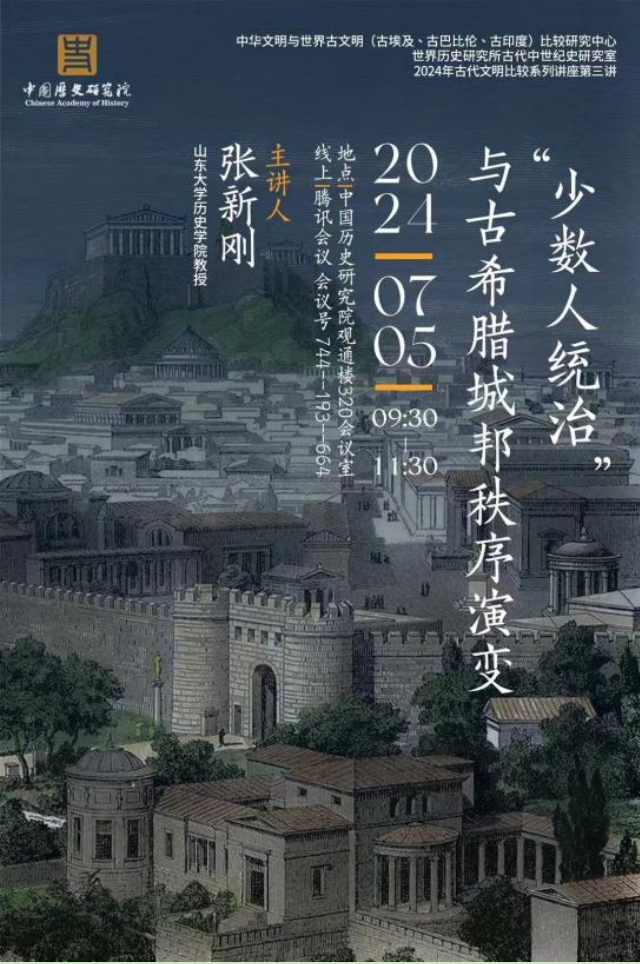On July 5, 2024, at the invitation of the Center for Comparative Studies of Chinese Civilization and Ancient Civilizations of the World and the Research Office of Ancient and Medieval History, CASS, Prof. Zhang Xingang from the School of History of Shandong University gave a lecture titled “‘Oligarchy’ and the Evolution of the Ancient Greek City-State Order”.
Prof. Zhang firstly sorted out the academic history on the study of ancient Greek oligarchy since the end of the 19th century, and pointed out that the study of oligarchy is a weak link in the field of political history of the classical Greek era. This phenomenon is closely related to the objective fact that the relevant historical materials are weak, but contemporary scholars should still pay attention to this polity, which had a profound impact on the political history of Ancient Greece, and constantly try to conduct original research. According to Prof. Zhang, the concept and terminology of oligarchy were first seen in the discussion of the advantages and disadvantages of various polities in the Persian court written in Herodotus’ Histories in the mid-to-late 5th century BC, and also appeared in the text of Pseudo-Xenophon’s Constitution of the Athenians. In the above-mentioned Greek writers of the early classical period, “oligarchy” meant “rule by the best and brightest”, and was judged on the basis of whether the members of the ruling group were of good birth and education, and the corresponding sentiments were basically positive. The appearance of Thucydides’ History of the Peloponnesian War marked a fundamental shift in the attitude toward oligarchy in ancient Greek political and cultural history. In the historical context of the rivalry between Athens and Sparta, “oligarchy” began to become the antithesis of “democracy” and a close synonym for “tyranny”. Oligarchy was seen as the tyranny of the few over the many, and began to take on a definite pejorative character. In the context of Plato and Aristotle in the 4th century BC, oligarchy was defined as a form of government in which the rich ruled over the poor for the purpose of pursuing wealth, and the criterion for judging “oligarchs” changed qualitatively. At the same time, however, in the history of the Greek city-states, recognized oligarchic city-states such as Corinth maintained a long period of political stability. Against the background of such complex changes in meaning and emotional coloring, misunderstandings and abuses of oligarchy by later generations of scholars are naturally inevitable. Prof. Zhang pointed out that in order to avoid logical confusion in research, it is necessary for contemporary scholars to go beyond the negative definition of “oligarchy” by late classical writers and return to the neutral meaning of the term, which means “minority rule”.
In his report, Prof. Zhang Xingang emphasized that “minority” in the context of “oligarchy” can refer to both a minority corresponding to the majority and a part of the citizenry as a whole. In terms of the number of people, the ruling group defined as “oligarchic” could range from 30 to 1,000 people, which allowed for a high degree of flexibility. Indeed, the concept of “minority” is often highly ambiguous in specific historical contexts. Sparta, which is usually regarded as a typical oligarchy, was also described by its own general Brigidas as a city-state in which “the majority rules over the minority”; there was often no difference between oligarchic and democratic city-states in terms of their institutional set-ups; and the terms “ruled by a council” and “property qualifications for office” were often used in the same way as the term “oligarchy”. Neither “ruled by a council” nor “property qualifications for office” were sufficient indicators of the existence of an oligarchy, since citizens’ assemblies played an important role in the majority of Greek city-states; whereas Corinth, a city-state recognized as an oligarchy, did not have property qualifications, some Athenian offices had property qualifications for office. At the same time, the ideal political model designed by Plato and Aristotle actually contains many elements of “minority rule”.
Prof. Zhang points out that the classification statistics of the existing samples of ancient Greek city-states show that the model of “oligarchy” occupies half of the known city-states, and occupies a pivotal position in the political history of ancient Greece. Minority rule was achieved primarily through specific regulations on eligibility, tenure, and institutional functions, all of which operated centrally to prevent usurpation of power by tyrants and to prevent the population from having too much power in political decision-making. Oligarchy is not diametrically opposed to democracy; there are differences and many commonalities between the two. The oppressive nature of some oligarchic regimes led to unrest and revolution in the city-states, but regimes such as Corinth, which had long practiced “minority rule” were also able to maintain a good degree of stability. It is clear that the stability of oligarchic regimes is influenced by their own traditions, internal structure and external reasons.
After the presentation, Prof. Zhang had a wide-ranging and enthusiastic discussion with researchers of the Institute of World History and students of the University of Chinese Academy of Social Sciences on the feasibility of cross-fertilization between the disciplines of world history and the history of political thought, the theory of polity in Aristotle’s Politics, and the inheritance of Greco-Roman political thought by the Byzantine Empire, and other issues.
